Toddlers are naturally wiggly, curious, and ready to move — and for many parents, that means the toddler years feel like one constant scramble after another. The “ugly truth” is that when we lack structure, tools, and intention, those wiggles turn into tantrums, power struggles, and frustration.
The good news? The Montessori method offers a pathway with a series of Montessori toddler essentials that you will find helpful — not by suppressing the movement, but by channeling it into meaningful activity, independence, and growth. By combining discipline the Montessori way with practical-life tasks, we can transform “wiggly” into “working,” “fussy” into “focused,” and daily chaos into calm routines.
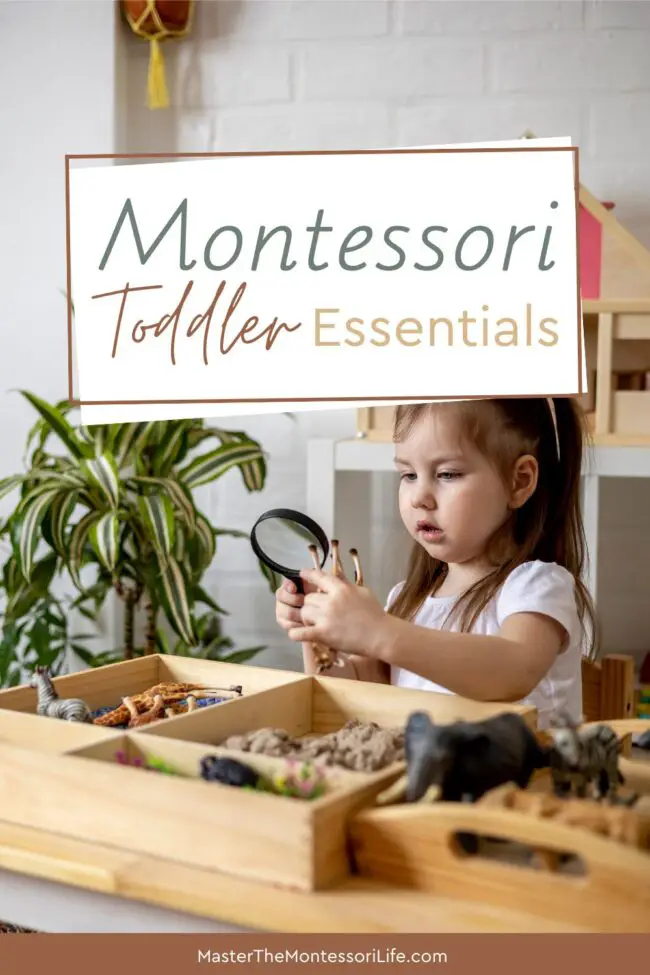
Practical Life: The Foundation of Montessori Toddler Discipline
In Montessori early-childhood education, the “Practical Life” area is central — it’s where children learn real-world tasks (pouring, spooning, wiping, setting a table) that build coordination, independence, and confidence. As one summary explains: “Practical life activities create opportunities for children to gain independence, coordination, and confidence through purposeful work.”
What this means for the wiggly toddler: instead of fighting their movement impulse, we provide controlled, child-sized tasks that allow them to move, explore, and succeed. When a child can remove a chair, wipe a table, pour water, or fold a cloth, they feel competent — and that competence reduces frustration and the need to act out.
In the toddler years, these tasks also map beautifully to what Montessori calls the “sensitive periods” when children are drawn toward movement, practical work, and order. By offering relevant tasks, we give the toddler’s energy and attention a constructive outlet. And that outlet becomes the basis of discipline: not in the sense of punishment, but in the sense of self-regulation, skill, and confidence.
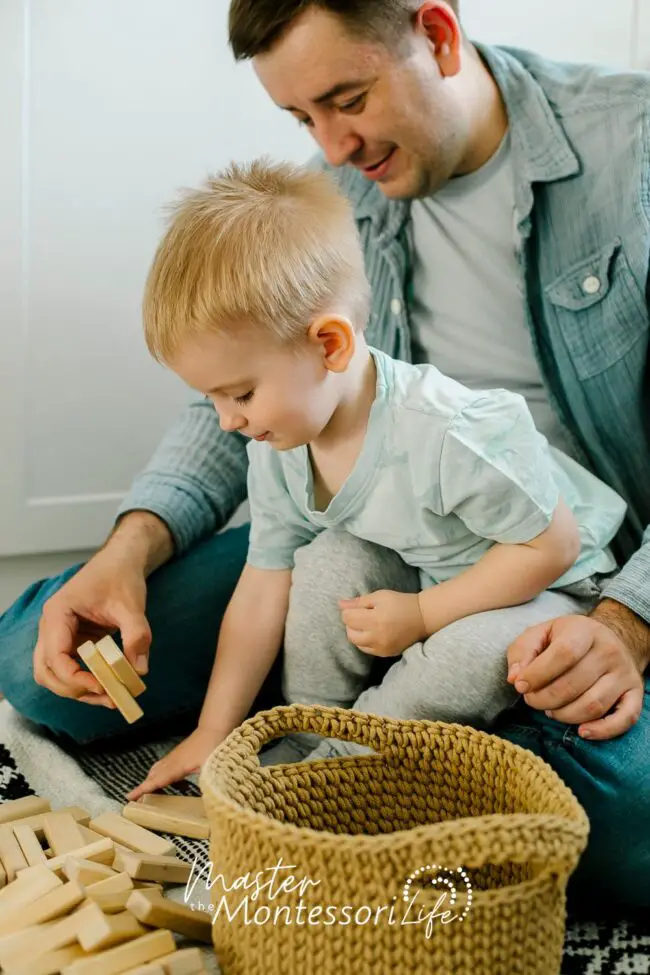
Food, Chores and the Wiggly Toddler: How to Help With Practical Life Food Struggles
One of the trickiest transition points for toddlers is food: they may resist eating, have strong preferences or dislikes, and get into power struggles at mealtimes. On Master the Montessori Life, the post “Helping Children with Food Struggles” points out that many children bring home habits into the Montessori-inspired space, and it can “throw a wrench into your Practical Life meal-prep planning.”
The Montessori route here is two-fold: include the child in food-prep tasks (peeling, pouring, cutting soft fruit, setting the table) and focus on healthy habits, autonomy and involvement rather than coercion. Involving a wiggly toddler in the routine of food — washing produce, setting utensils, passing items — allows the movement impulse, gives them a role, and shifts the relationship from “I’m resisting” to “I’m helping.”
Likewise, chores are not separate from the Montessori discipline, but integral to it. Getting the child to do chores — matched to their ability and size — gives them agency, purpose, and helps to channel their movement in service of the home environment. Rather than seeing chores as a burden, we see them as Practical Life tasks. This transformation allows the wiggly toddler to move, act, succeed — and in doing so, to develop the self-discipline of contribution and competence.
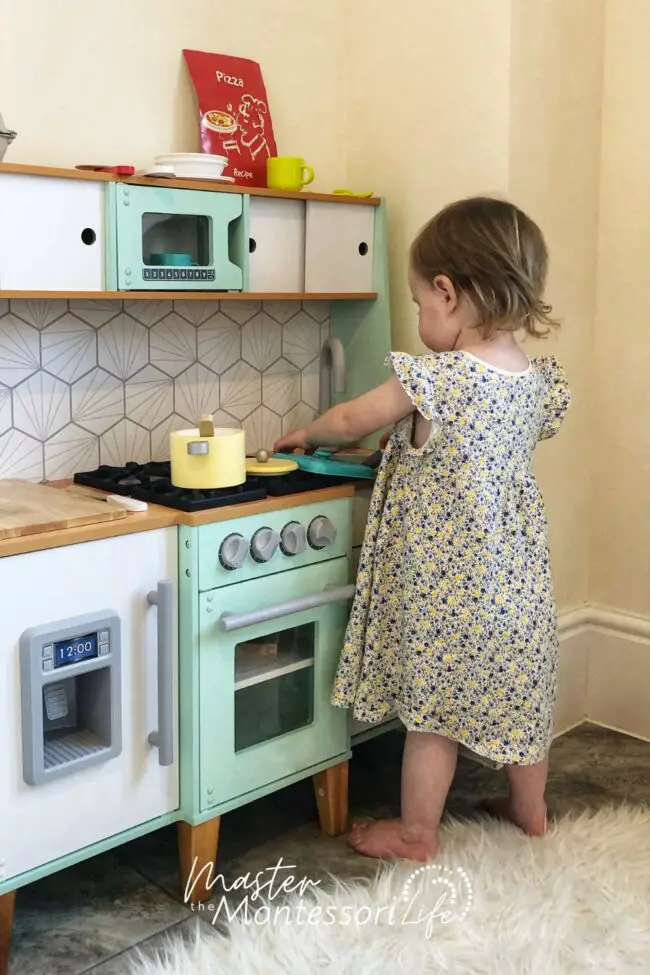
Benefits of Doing Montessori with Toddlers: Beyond the Wiggles
When parents and educators adopt the Montessori approach with toddlers, the benefits extend far beyond managing wiggles. As Master the Montessori Life explains in “The Benefits of Doing Montessori with Toddlers,” starting early with this method helps children build independence, problem-solving skills, emotional intelligence, and practical life skills.
For a toddler, movement, exploration, and engagement are natural — Montessori harnesses those impulses into structured freedom: freedom within limits. That means as adults we provide a prepared environment, the right materials, and follow the child. The result? A child who is more self-regulated, more confident, and more willing to engage in meaningful tasks rather than simply bouncing off the walls.
Moreover, the habit of doing (rather than being passively entertained) sets the stage for later learning: concentration, coordination, focus, and a sense of responsibility. The wiggly toddler isn’t an obstacle — they are a resource. With the right approach, those wiggles become purposeful movement, part of a trajectory toward independence, respect, and capability.
One tool that supports this kind of work is the printable resource set from Master the Montessori Life: the Montessori Practical Life STEP 1 Checklists — a set of six printable checklists covering the key categories of the Practical Life curriculum, helping parents and teachers track lessons, mastery and progress. Whether you’re working at home or in a class-setting, having structured tracking empowers you — and ultimately the child.
When you bring Montessori discipline into the toddler years, you’re not imposing rigidity but offering structure: structure that respects movement, curiosity and the child’s drive to do. By focusing on practical life skills, inviting involvement in food and chores, and embracing the toddler’s natural energy as a developmental asset, you transform wiggles into purposeful action.
If you’d like to dive deeper into how to teach your wiggly toddler using the Montessori method — and explore specific episodes, materials and supports — I can help you map out step-by-step activities and environment setups that align perfectly with the topics above.
You might also enjoy these relevant topics:
- Introduce Hibernation, Migration and Adaptation to Children
 When you introduce your children to the concepts of hibernation, migration and adaptation, you will love to learn how they find food, which ones follow each of these survival techniques and so much more.
When you introduce your children to the concepts of hibernation, migration and adaptation, you will love to learn how they find food, which ones follow each of these survival techniques and so much more. - Montessori Farm Sensory Bin: Hands-On Learning
 A Montessori farm sensory bin is simple to assemble, rooted in purposeful work, and designed to invite deep exploration.
A Montessori farm sensory bin is simple to assemble, rooted in purposeful work, and designed to invite deep exploration. - Tips to incorporate Fall into your Montessori environment
 Come and find out how you can highlight and celebrate Fall in your Montessori environment without stressing out about it.
Come and find out how you can highlight and celebrate Fall in your Montessori environment without stressing out about it. - Hands-On Fun: 3 Montessori Practical Life Activities for Fall
 These simple Montessori Practical Life activities for Fall are easy to do anytime you have the materials ready.
These simple Montessori Practical Life activities for Fall are easy to do anytime you have the materials ready. - Embracing Autumn: A Montessori Guide to Fall Fun
 Spread the loveThe arrival of autumn brings a special kind of magic. The air turns crisp and leaves paint the…
Spread the loveThe arrival of autumn brings a special kind of magic. The air turns crisp and leaves paint the… - Montessori Toddler Essentials
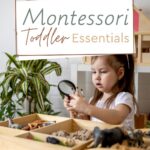 The Montessori method offers a pathway with a series of Montessori toddler essentials that you will find helpful.
The Montessori method offers a pathway with a series of Montessori toddler essentials that you will find helpful.

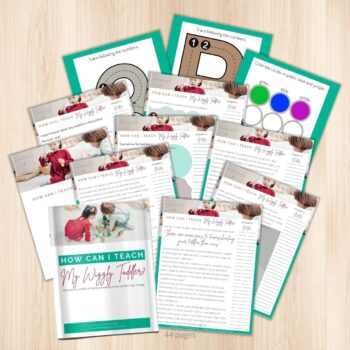
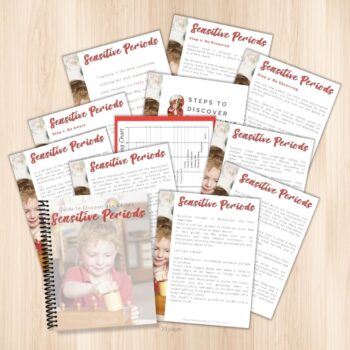
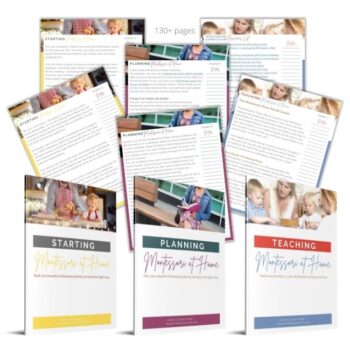

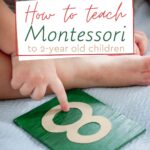
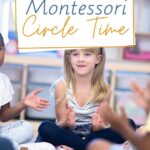

Leave a Reply